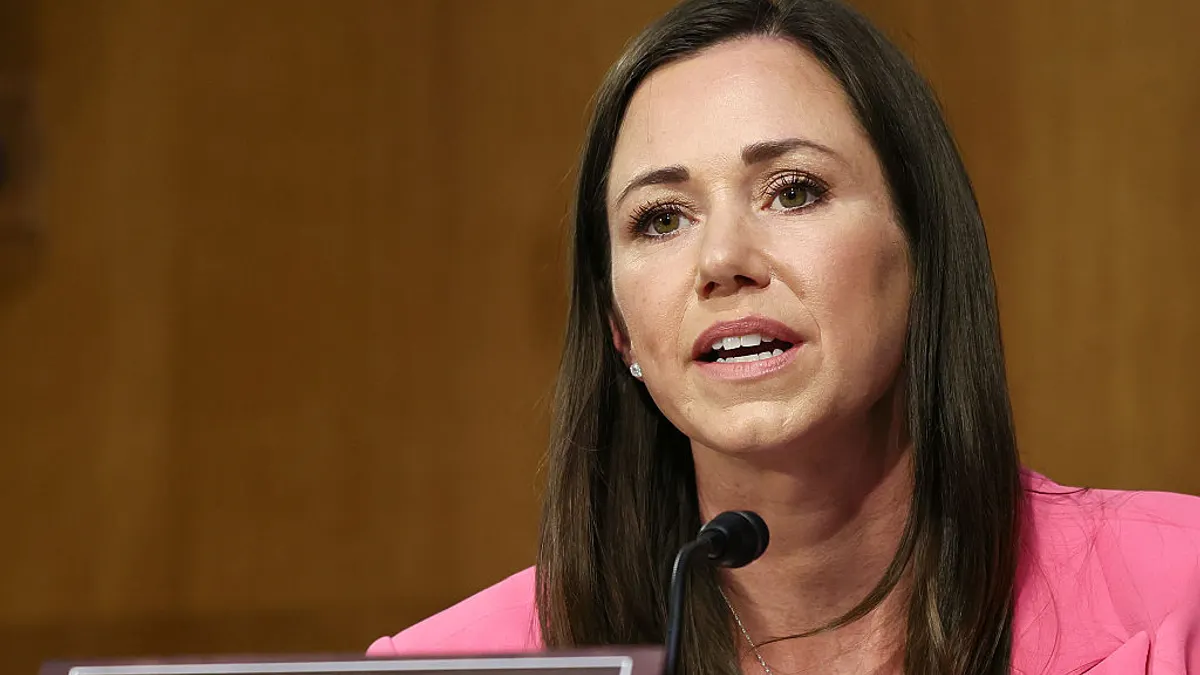Dive Brief:
- Senate Banking Committee Republicans are calling on bank regulators to revamp the process around matters requiring attention for financial institutions, to address “shortcomings.”
- “We are concerned that the lack of structure, uniformity and legal basis has allowed the [matters requiring attention] process to become increasingly opaque, ineffective and inconsistent,” the group of 11 senators wrote in a Wednesday letter to Federal Reserve Vice Chair for Supervision Michelle Bowman, Comptroller of the Currency Jonathan Gould and Federal Deposit Insurance Corp. Acting Chairman Travis Hill.
- Lawmakers pushed for a rethink of current definitions and the creation of clear standards and expectations around the issuance and resolution of MRAs, put forth through a formal rulemaking process. “Without true legal grounding and accountability on both sides, MRAs risk becoming a check-the-box exercise rather than a valuable supervisory tool that can mitigate more widespread risk,” senators wrote.
Dive Insight:
Changes to matters requiring attention, or MRAs, mark the latest regulatory alteration effort by Republican lawmakers, who have pushed to roll back some bank rules and emphasize tailoring requirements for banks. All three agencies have dropped reputational risk considerations from bank exams, and the Fed has proposed changes to the enhanced supplementary leverage ratio and to the supervisory rating framework for big banks.
MRAs refer to supervisory findings flagged during bank exams, pointing out deficiencies or violations of law that require remediation. Banks are typically expected to draft plans to address MRAs in a reasonable amount of time, to avoid the issue escalating to a matter requiring immediate attention, or resulting in a rating downgrade or enforcement action.
MRAs were created by the regulatory agencies via informal guidance, not written into law or regulation, offering agencies “broad discretion” that has “allowed the process to devolve into a subjective supervisory tool, vulnerable to inconsistent application,” the senators asserted.
One example: All three prudential regulatory agencies have developed their own internal definitions and standards for issuing and resolving MRAs, which creates confusion for banks, lawmakers noted.
The letter was signed by Sens. Tim Scott of South Carolina; Katie Britt of Alabama; Mike Crapo of Idaho; Mike Rounds of South Dakota; Thom Tillis of North Carolina; Bill Hagerty of Tennessee; Cynthia Lummis of Wyoming; Pete Ricketts of Nebraska; Jim Banks of Indiana; Kevin Cramer of North Dakota; and Dave McCormick of Pennsylvania.
Lawmakers also pointed to banks’ inability to formally challenge MRAs, many of which, they contended, “are not clearly grounded in ‘safety and soundness’ principles.” Additionally, the highly confidential nature of MRA information adds complication.
Senators lamented the lack of consequences for regulators failing to follow up, escalate or ensure resolution even if a bank’s condition deteriorates, and warned MRA misuse and overuse poses risks, too.
The March 2023 failure of Silicon Valley Bank exposed “fundamental flaws” in the MRA process, senators said. At the end of 2022, the bank had 31 active MRAs or matters requiring immediate attention, “some even dating back multiple examination cycles.”
Six of those MRAs or MRIAs specifically related to liquidity risk management and positions were unresolved for 16 months, the senators said, yet the bank maintained a satisfactory rating for management and liquidity, suggesting regulators weren’t considering their own findings.
At the same time, SVB’s other active MRAs “focused on vague and often redundant governance issues” that may have obscured attention from critical risks the lender faced, they wrote.
The group of legislators called for uniform standards across the Fed, OCC and FDIC “based on true bank ‘safety and soundness.’”
They also requested regulators consider whether changes are needed to the confidential supervisory information framework. Although it provides safeguards around sensitive information, “regulators should consider the impact on banks' ability to remediate or challenge an MRA,” senators wrote.
“We must ensure that MRAs are used judiciously – reserved for material risks and accompanied by legal grounding and clear expectations for banks,” senators wrote. “Regulators must also be held accountable for ensuring these deficiencies are clearly identified, resolved in a timely and appropriate manner, and are consistently enforced.”













